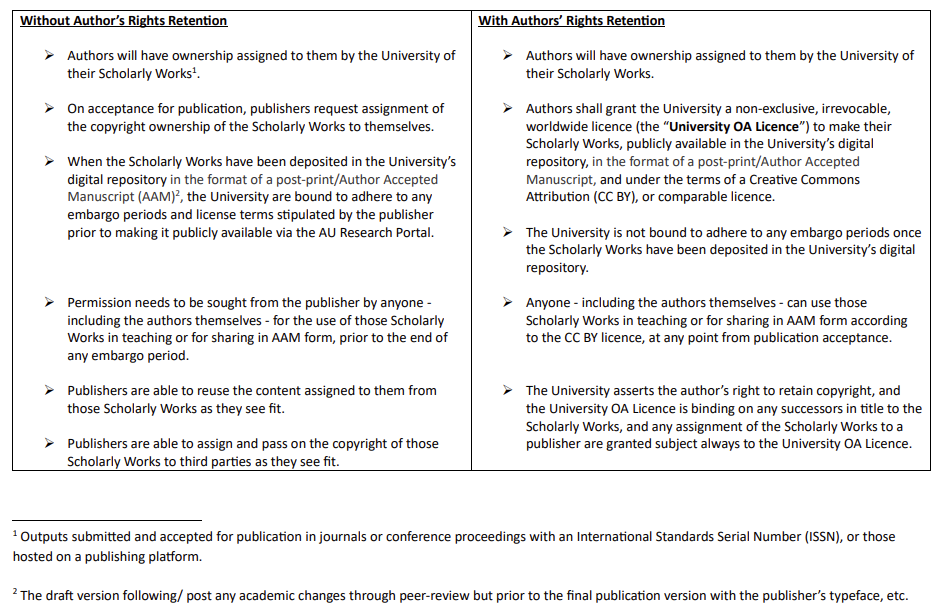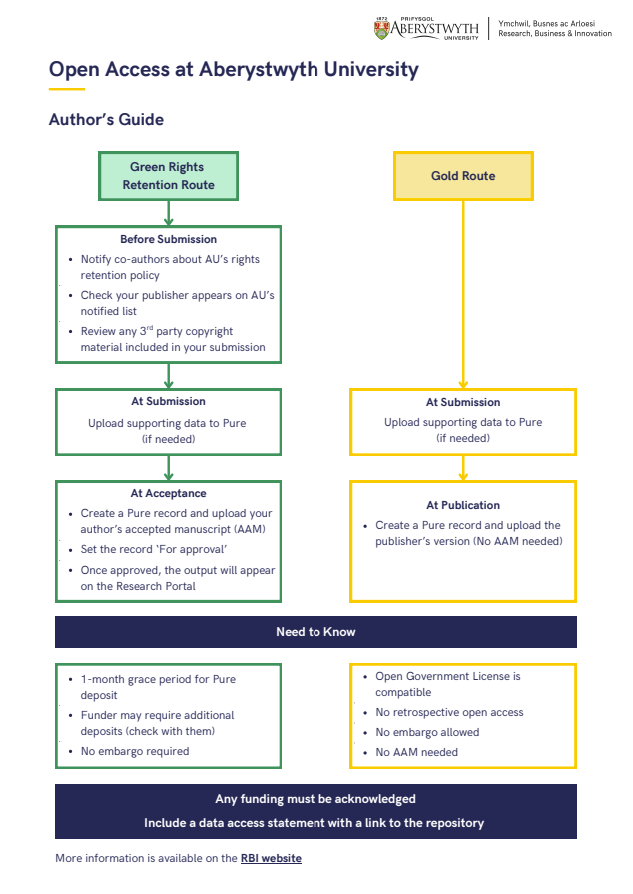Rights Retention
Aberystwyth University (‘AU’) is committed to disseminating its research and scholarship as widely as possible. In line with cOAlition S and its Plan S principles, and to comply with funder and research open access requirements, from 1st January 2026, AU will be exercising authors’ Rights Retention.
This allows AU Authors to retain sufficient rights to allow the University to provide immediate open access to the Authors’ Accepted Manuscript (‘AAM’)/ post-print of scholarly works submitted and accepted for publication in journals or conference proceedings with an International Standards Serial Number (ISSN), or those hosted on a publishing platform. All publishers with whom AU authors have recently published have been notified about this policy change by the University.
What is Rights Retention?
Rights Retention is a strategy that allows authors to keep the copyright in their work, instead of transferring it to a publisher, enabling the deposit of their accepted author manuscript (AAM) immediately into an open access repository under an open license, such as a Creative Commons Attribution (CC-BY) license. This enables the author and others to share and reuse the research without publisher restrictions and embargoes, while also ensuring immediate open access and compliance with funder policies.
Rights retention is a funder initiative from cOAlition S, and over 50 UK HEIs have an Author’s Rights Retention policy in place: https://sje30.github.io/rrs/rrs.html
Without Author's Rights Retention and with Author’s Rights Retention
Click the above table to enlarge.
FAQs
1. Why is Aberystwyth adopting rights retention?
a. It makes open access simple, keeps you compliant with funders and REF, it lets you publish where you want, and gives you the freedom to share and reuse your own work. We will notify publishers and support you throughout.
2. Who must follow the rights retention policy?
a. Aberystwyth authors and co-authors who are staff; or students whose funders have open access requirements.
3. Does this apply to books, monographs, or chapters?
a. No.
This does not currently apply to so called “long-form” outputs.
4. Does this apply if my publisher is outside the UK?
a. Yes.
Our prior-notice approach applies wherever the publisher is based. If your journal isn’t on our notified publishers list, email openaccess@aber.ac.uk and we’ll help.
5. Which publishers have been notified?
a. We have contacted most publishers our authors have worked with over the past 5 years.
Our list of notified publishers is regularly updated and is available here.
If your publisher isn’t listed, email openaccess@aber.ac.uk so that we can notify them.
6. What if my publisher queries this?
a. This is uncommon, but if it happens: forward the query to openaccess@aber.ac.uk; we’ll respond and advise you. You don’t need to negotiate - we’ll handle it.
7. Who else uses rights retention?
a. Harvard has been using rights retention since 2008, and in the UK, Edinburgh started in 2022. Lots of other HEIs have already adopted this approach, and more are joining them. Also, some bodies have never allowed copyright to be signed over in the first place such as the US or UK governments, leading to Crown Copyright for the UK.
8. What if my co-authors are at other institutions or have questions about rights retention?
a. Explain that we use rights retention to promote open access to research without limiting where authors can publish, that it helps everyone stay compliant without any extra work. Share this FAQ with them early, if queries or objections arise then contact us for advice.
9. Does this policy apply retrospectively?
a. No.
This policy applies to scholarly works submitted and accepted for publication in journals or conference proceedings with an International Standards Serial Number (ISSN), or those hosted on a publishing platform from the 1st of January 2026.
10. Does this limit where I can publish?
a. No.
You can still publish in your preferred journals.
11. Does rights retention cost anything?
a. No
12. What is the Author Accepted Manuscript/AAM/post-print?
a. This is the peer-reviewed version you approve after peer review but before the publisher’s copy-editing and branding. An AAM diagram can be found here.
13. What if I move institution? Can I still use my work?
a. Yes.
You keep the right to share and reuse your Author’s Accepted Manuscript (AAM) forever. The open version in the AU Research Portal stays available for others to read and cite.
14. My publisher has sent a copyright/licence agreement - what should I do?
a. Rights retention doesn’t interfere with you signing these agreements if you wish to. Rights retention continues to apply regardless of any future agreements; you can always send us the agreement for advice if you are unsure.
15. Will this let me be compliant for the next REF and my funder’s open access requirements?
a. Yes.
Rights retention means you only follow one simple process - no embargoes, no extra steps - and you stay compliant with funders and REF automatically.
16. Why is a Creative Commons Attribution (CC BY) Licence required? Can I change this or opt-out?
a. The CC BY licence is the preferred licence for most funders, and it maximises re-use options. If you need to change the licence used, then contact openaccess@aber.ac.uk and we’ll advise on exemptions and funder implications.
17. Can I still publish gold open access via our transitional agreements or through the payment of an article processing charge (APC)?
a. Yes.
Rights retention gives you a free route, gold is still an option if you prefer that route. If you are publishing in a fully open access gold journal, then you automatically retain your rights.
18. My work includes 3rd party materials, does rights retention affect this?
a. No.
Rights retention only applies to your own text in the AAM. However, you need to make sure that 3rd party content is handled correctly.
Either make it clear in your manuscript that 3rd party content is not covered by the CC BY licence, or
When negotiating permissions, include permission to use the material under a CC BY licence.
If you’re unsure how to do this, need wording for credit lines, or just need general help with copyright then please contact us at openaccess@aber.ac.uk for advice.


